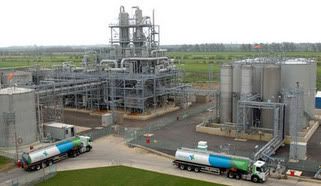UK opens first bioethanol plant, based on sugar beet
The UK's first bioethanol plant managed by British Sugar was officially opened yesterday. The facility, which is located alongside the world's largest beet sugar factory at Wissington, Norfolk will produce 70 million litres (18.5 million gallons) of bioethanol annually from locally grown sugar beet. The sugar factory's efficient combined heat and power plant also provides energy for the ethanol plant ensuring that the fuel produced there delivers a carbon emissions saving of at least 60% compared to fossil-derived petrol.
The plant began production trials in September 2007, reached design throughput within the first two weeks of operation and produced fuel grade bioethanol within three days of start up. The first batch of UK-produced bioethanol was delivered to the UK market during the week commencing September 24.
Each year the plant will use 110,000 tonnes of sugar, obtained from the largest sugar beet refinery. The Wissington plant is an important step towards the goals set out by the UK government's Renewable Transport Fuel Obligation (RTFO), which set a target of 5% renewable fuel use in the UK by 2010, as required by the EU.
British Sugar pushes the sustainability of its operations ensuring nothing is wasted during the production of bioethanol. The sugar beet itself, after the sugar is extracted, is marketed for high-energy animal feed. Molasses, the final syrup from which no more sugar may be extracted, is used as a feedstock by the fermentation industry. The small amount of soil adhering to the sugar beet is marketed to landscapers, architects and farmers, ensuring that this valuable non-renewable resource is used in a sustainable way. The lime products produced as part of the purification process are sold under the LimeX brand for soil conditioning. Even the stones delivered along with the sugar beet are separated, graded and washed and sold:
 energy :: sustainability :: biomass :: bioenergy :: biofuels :: ethanol :: sugar beet :: CHP :: UK ::
energy :: sustainability :: biomass :: bioenergy :: biofuels :: ethanol :: sugar beet :: CHP :: UK ::
At the Wissington site, in addition to the bioethanol plant, the sustainability is further extended by an associated horticulture operation where around 70 million tomatoes are grown each year in the UK's largest glasshouse - 11 hectares - benefiting from waste heat and CO2 from the sugar factory's power plant.
References:
British Sugar: Lord Rooker opens UK’s first bioethanol plant - November 22, 2007.
The plant began production trials in September 2007, reached design throughput within the first two weeks of operation and produced fuel grade bioethanol within three days of start up. The first batch of UK-produced bioethanol was delivered to the UK market during the week commencing September 24.
Each year the plant will use 110,000 tonnes of sugar, obtained from the largest sugar beet refinery. The Wissington plant is an important step towards the goals set out by the UK government's Renewable Transport Fuel Obligation (RTFO), which set a target of 5% renewable fuel use in the UK by 2010, as required by the EU.
British Sugar pushes the sustainability of its operations ensuring nothing is wasted during the production of bioethanol. The sugar beet itself, after the sugar is extracted, is marketed for high-energy animal feed. Molasses, the final syrup from which no more sugar may be extracted, is used as a feedstock by the fermentation industry. The small amount of soil adhering to the sugar beet is marketed to landscapers, architects and farmers, ensuring that this valuable non-renewable resource is used in a sustainable way. The lime products produced as part of the purification process are sold under the LimeX brand for soil conditioning. Even the stones delivered along with the sugar beet are separated, graded and washed and sold:
 energy :: sustainability :: biomass :: bioenergy :: biofuels :: ethanol :: sugar beet :: CHP :: UK ::
energy :: sustainability :: biomass :: bioenergy :: biofuels :: ethanol :: sugar beet :: CHP :: UK :: At the Wissington site, in addition to the bioethanol plant, the sustainability is further extended by an associated horticulture operation where around 70 million tomatoes are grown each year in the UK's largest glasshouse - 11 hectares - benefiting from waste heat and CO2 from the sugar factory's power plant.
Against a background of unprecedented change in the European sugar industry we are transforming our business. In addition to our expansion in sugar in Southern Africa and China, the Wissington bioethanol project clearly demonstrates our ability to identify and develop opportunities in markets where we can add value. - British Sugar Group chief executive, Mark CarrBritish Sugar has also entered a joint venture, Vivergo Fuels Limited, with BP and DuPont to build and operate a world scale bioethanol plant at Saltend, Hull. Expected to come on stream in 2009, this plant will produce 420 million litres of bioethanol each year from UK grown wheat.
References:
British Sugar: Lord Rooker opens UK’s first bioethanol plant - November 22, 2007.
 --------------
--------------
 Note: Biopact's mail-server is being changed, so any incoming mails will bounce-back. The problem will be solved in the coming 12-24 hours.
Note: Biopact's mail-server is being changed, so any incoming mails will bounce-back. The problem will be solved in the coming 12-24 hours.









0 Comments:
Post a Comment
Links to this post:
Create a Link
<< Home